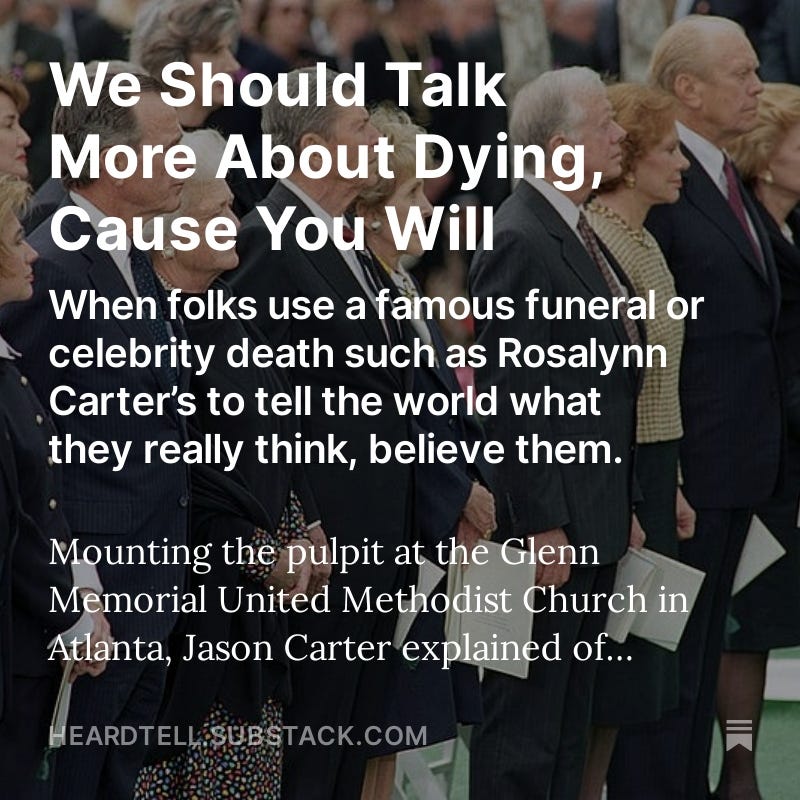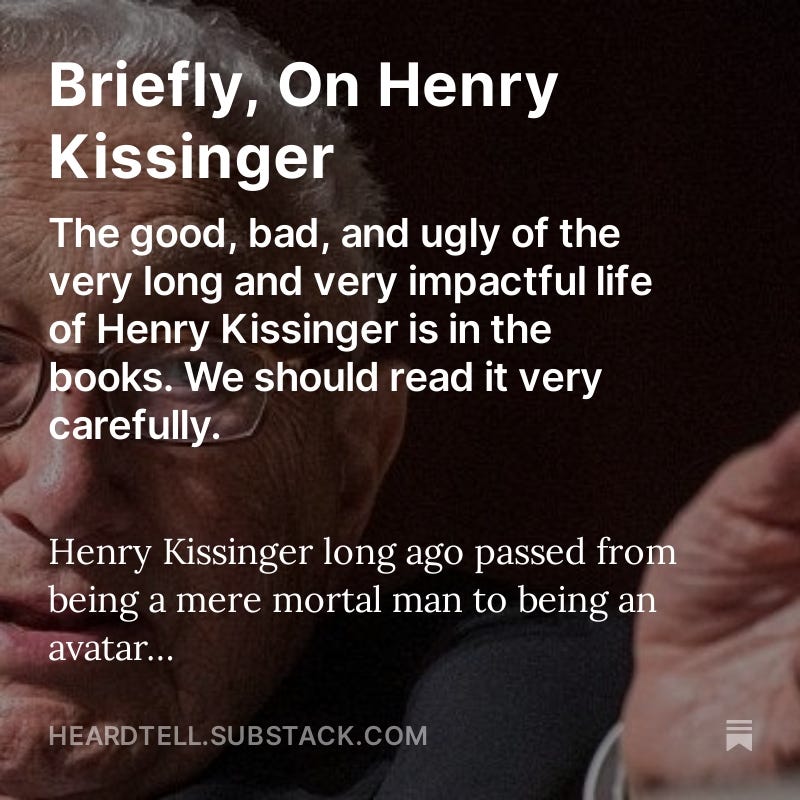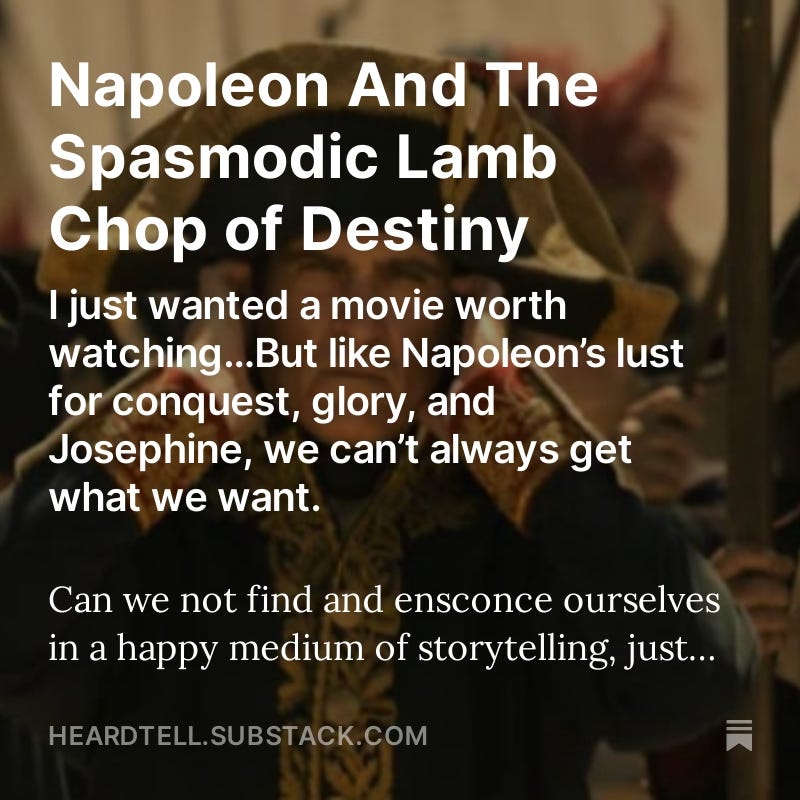
The coming of December means the final leg of the Year of Our Lord 2023 is upon us. I do hope this season of holidays, travel, giving, time off, extra work, joy, depression, or whatever chaos is coming your way in the coming days finds you and yours healthy, happy, and well fed.
As the new year approaches, I’m actively contemplating a few different options for what I am going to be doing with my public-facing work. I love doing Heard Tell, but with some personal situations that are changing in the coming weeks, doing a daily radio program is just not going to be possible. We are currently talking to folks involved about what form we will do going forward, reverting back to a traditional podcast, or some other idea. As always I will continue to write both in this space, and at Ordinary Times which is doing some really great work as of late. Also, I’ve heard some of you who have asked for more video content on YouTube, and it is something we are contemplating. And just personally, I want to do more food writing like the old Yonder & Home stuff.
Meanwhile this space, the Heard Tell SubStack, is going to be the best one-stop shopping for everything I’m trying to do. As always it will be free, and if you want to make a donation or support the work we try to put out for you that is greatly appreciated.
Anywho, to the good stuff:
This piece was shared and commented on more than anything I’ve written in a while, and I’m thankful for places like The Dispatch, Brent Orrell at AEI, and many, many others for boosting it. An excerpt:
Death, especially celebrity death, seems to be a starter pistol-like signal for too many to rush to their device and bare the darker corners of their soul because…why? The person who died, who has no clue who any of these folks are, is dead and can’t respond? Are the online seal claps of a particular in-group some precious resource that can be uniquely mined only as the digital community virtually rallies around the corpse in some sort of viral wake?
While the negative effects of having very online lives is often overblown hyperbole, there really does seem to be something to nationalized politics and culture distilled into personally curated online consumption that isn’t helping our sense of mortality. Social media — like money, power, and alcohol — emboldens and empowers folks to be more of what they really are internally to the outside world without the usual filters. When the filters are off, you get what really dwells in the heart and mind that the spell check of sobriety or keeping your bearing offline in the real world usually corrects.
Read the whole piece here
Good thing I wrote about keeping your bearing when a political celebrity dies THE DAY BEFORE HENRY KISSINGER KICKS OFF. In this piece I share thoughts about his legacy, the coverage thereof, and how we got to this place with a former Secretary of State and NSA in the first place. An excerpt:
This is, of course, all perspective with the advantage of hindsight. We see the world with China as a major player that Kissinger saw as a potential gamechanger on the world stage. We have seen the fall of the Soviet Union, and the brief Russian flirtation with something else before the gangster-like oligarchy of the tyrant Putin we currently are dealing with. We have a friend and ally in the still communist Vietnam, but with plenty of dead, wounded, and scarred Americans to show for it and many more dead, wounded, and scarred people throughout Vietnam, Cambodia and Laos.
Kissinger, powerful as he was, didn’t act alone, and Presidents Kennedy and Johnson don’t get the vitriol over the Southeast Asia mess that they handed Nixon, Ford, and Kissinger to clean up. The modern folks who are gleeful over memes and depictions of Kissinger in hell don’t seem to have the same anger at the now mythologized JFK or the LBJ that was as complicated as he was profane, both of whom tee’d up the conflicts Kissinger now gets his grave danced on over. There are some lessons to learn there as well.
Meanwhile, for today, the lesson we should ponder on, and long and hard at that, is that Kissinger was right that “History knows no resting places and no plateaus,” and the chaos of the world will never cease to lap upon the shores of America. For every crisis, there will arise leaders who will declare they can manage those waves, and bring back the balance of the slack tide America has mostly enjoyed despite a turbulent world.
I went and watched Ridley Scott’s Napoleon movie. I did so down in Atlanta, taking my daughter, and we had similar reactions summed up by here comment as we were shuffling out of the theater: “That was a weird way to try and explain that.” An excerpt:
I get what Scott was shooting for, I think, in juxtaposing l’empereur’s climb to power in post-Revolution France with his chaotic relationship with Josephine. The great man, master of Europe and the battlefield, but a man who couldn’t discipline himself in his own house or marriage. That’s a self-telling story, a narrative just waiting to be flushed out and explored.
The problem is, Scott makes the contrast without giving us anything to invest in, least of all Napoleon himself. Historically known to be both docile in private but highly charismatic in groups and ruthless in pressing his will, Phoenix’s Bonaparte comes off disinterested, disengaged, and something of a dope. Instead of flaws of personal character — which Napoleon had multitudes of — contrasting with achievement we are left with a repetitive blandness punctuated with the neck pains of whiplash when the tactical genius of Austerlitz meekly slinks into a mistress’s bed to purposefully breed a bastard child because his mommy told him to do so.
The cringe factor of Napoleon’s periodic 15-second sessions of chipmunk-on-cocaine-like coitus with his eye-rolling wife Josephine fail to endear either character to any sexually functional adult watching. The audience I was watching with snort-laughed the first time it happened, got quiet the second time it happened, and were perceivably squirming in their seats when it happened again. By the time the unhappy couple are throwing food — not the lamb chop that Napoleon declares as his destiny during the monologue leading up to but other, lesser side dishes — and divorcing, most one wonders why these characters care at all to be that upset about it.
The audience keeps waiting for any spark of anything from the immense abilities of Joaquin Phoenix in vain as Napoleon the tyrant with the blood of untold thousands on his hands becomes a bloodless, empty, mostly boring stuffed uniform in a period piece that can’t figure out what it wants to be when it grows up. When soldier’s break out into a “long live the emperor” at a key moment, the immediate reaction from a befuddled and tiring viewer is to ask “why?”
Other things worth your time:
Farrah Fawcett and Grilled Spaghetti Sauce
Given the choice between abandoning an imprinted notion of sexuality and this grilled spaghetti sauce, I chose the sauce. By Ben Sears at Ordinary Times
2024 Oscar Projections: Post-Thanksgiving Temperature Check
Its Post-Thanksgiving And I'm Ready To Keep Tracking All Eight Above-The-Line Oscars Races For The 96th Ceremony by Mendez Movie Report
Where Are the AI Skepticism Stories?
People really care about how they come across, especially professional opinion-havers and thought-makers. By Freddie de Boer from his SubStack
The Kennedy Assassination: 60 Years On
Sarah Stook looks back on the Kennedy assassination at its 60-year anniversary.
The Madness Of The Multiverse: How Infinite Universes Are Killing The Superhero Genre
Even if sometimes the multiverse can create interesting conflicts, more often than not it's just a narrative shortcut with messy results. by Erik Kain at Diabolical
The Next ESG Frontier: Natural Asset Companies
What are Natural Asset Companies, and why does the SEC wants them listed on the NYSE? And why it should concern supporters property rights AND public lands access? By Gabriella Hoffman at Real Clear Markets







